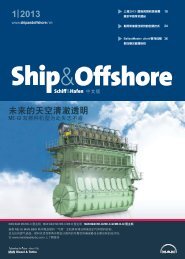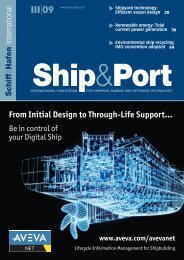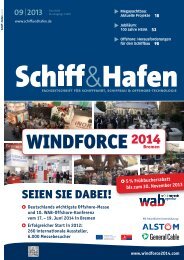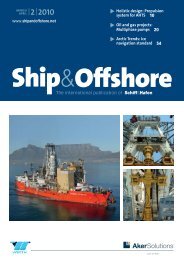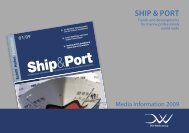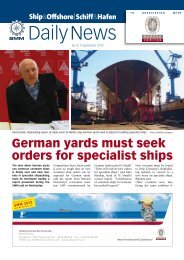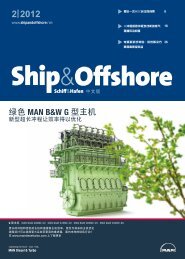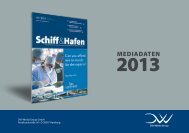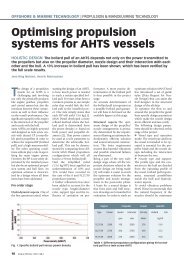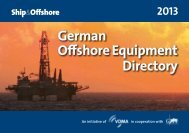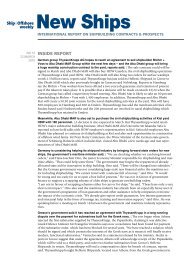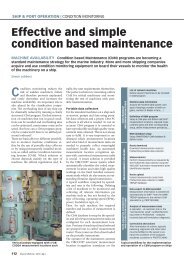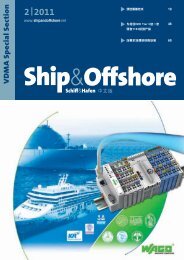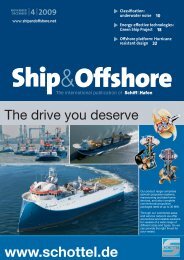Download - Shipandoffshore.net
Download - Shipandoffshore.net
Download - Shipandoffshore.net
You also want an ePaper? Increase the reach of your titles
YUMPU automatically turns print PDFs into web optimized ePapers that Google loves.
Monday, May 13th<br />
Tuesday, May 14th<br />
Wednesday, May 15th<br />
Thursday, May 16th<br />
proportional to the square root of the injected fuel mass injection<br />
pressure rises above 3,000 bar and the operating data improve.<br />
Sfoc for example is reduced by another 2.5%. Summarised it can<br />
be stated that improvements in operating data are possible. The<br />
challenge is to control the high mechanical and thermal loads<br />
and to provide the required high efficiency of the turbocharging<br />
system.<br />
A fundamental study on improvement of ignition<br />
behavior of low ignitability fuel with pilot injection<br />
Satoshi Kawauchi, National Maritime Research Institute, Japan<br />
Masahide Takagi, National Maritime Research Institute, Japan<br />
New regulations of the IMO, introducing drastic reductions in<br />
fuel sulphur content, allow 0.1% sulphur in fuels used in ECAs,<br />
starting from 2015. Together with the worldwide situation of<br />
decreasing fuel resources, the introduction of alternative fuels<br />
complying with future regulations of marine diesel fuel displays<br />
an important research these days. Light cycle oil (LCO) also referred<br />
to as ’cracked gas oil’, a sub-product from the FCC process<br />
in refining, has the potential to be used as an alternative for<br />
current marine fuels. LCO shows a high content of aromatic hydrocarbons,<br />
mainly composed of one and/or two ring aromatics.<br />
In general, aromatics are chemically less reactive compared<br />
with paraffinic compounds and therefore it can lead to a strong<br />
deterioration of the ignition and combustion characteristics. Especially<br />
for medium- and high-speed engines, the deteriorated<br />
combustion characteristics, such as long ignition delay, long<br />
after-burning and long flame-length, could result in the trouble<br />
for the piston ring and cylinder liner causing the dry-out of the<br />
lubricating oil film. Pilot injection is one of the techniques to<br />
reduce the difficulty in the engine operation with low ignitability<br />
fuel. Experimental results show that the pilot injection enables<br />
the engine to operate on the LCO smoothly without causing excessive<br />
pressure rise rate. On the other hand, the result shows<br />
that the heat release rate is significantly affected by the fuel injection<br />
quantity and timing. It implies that injection parameters<br />
for pilot fuel should be optimised in order to realise the reliable<br />
operation. Considering that the ignition behaviour of pilot fuel<br />
heavily depends on fuel ignitability, it is expected that optimal<br />
injection parameters depend on the fuel ignitability. Therefore,<br />
in order to utilise pilot injection under several conditions for fuel<br />
ignitability, it is important to obtain deeper understanding on<br />
the roles of how pilot injection influences the improvement of<br />
the ignition behaviour. This study investigates the effects of pilot<br />
injection on the ignition behaviour using a rapid compression<br />
machine. Pilot injection parameters were varied systematically<br />
under different two ambient gas temperatures with two types of<br />
fuel. Shadowgraph was applied in order to obtain detail information<br />
on ignition process promoted by pilot injection. Visualisation<br />
results provided detailed explanation on the roles of pilot<br />
injection in ignition event of main fuel.<br />
Wednesday May 15th / 15:30 – 17:00 Room B<br />
Environment, Fuel and Combustion<br />
Gas and Dual-Fuel Engines – Combustion Aspects<br />
The MAN ME-GI engine: From initial system<br />
considerations to implementation and performance<br />
optimisation<br />
Lars Ryberg Juliussen, MAN Diesel & Turbo, Denmark<br />
Stefan Mayer, MAN Diesel & Turbo, Denmark<br />
Michael Kryger, MAN Diesel & Turbo, Denmark<br />
The ME-GI concept is based on a diesel-type combustion process<br />
of a gas jet that is injected into the combustion chamber with high<br />
pressure between 150 and 315 bar depending on engine load. The<br />
ignition of the gas is ensured by the injection of a small amount of<br />
diesel oil prior to gas injection - the pilot injection. This paper describes<br />
the ME-GI concept and its implementation on a dedicated<br />
test engine as well as on a production type engine. Furthermore,<br />
it also presents performance and emission results from a subsequent<br />
optimisation effort. Successful development of the ME-GI<br />
concept required a suitable research facility platform for thorough<br />
investigations and engine tests. Therefore, it was decided to retrofit<br />
an electronically controlled two-stroke low-speed marine diesel<br />
research engine, 4T50MEX, to gas operation. Retrofitting the<br />
research engine to gas operation required the development and<br />
installation of gas engine components as well as the development<br />
of a new control and safety system, which is added to the standard<br />
electronic control system. Before adopting all new components<br />
and software to the research engine, preliminary tests were carried<br />
out on a one-cylinder gas test rig in order to verify the functionality<br />
and reliability of the ME-GI concept. The establishment of<br />
the gas research platform also required considerable preparations<br />
in order to achieve authority approval of the gas supply installation,<br />
which was established according to EU’s ATEX regulations<br />
(e.g. Directive 94/9/EC, concerning equipment and protective systems<br />
intended for use in potentially explosive atmospheres). The<br />
ATEX regulations required for example risk analysis, zone classification<br />
plans and education of engineering staff. The engine tests<br />
performed can be divided into a two groups. Firstly, the ME-GI<br />
engine is benchmarked directly against operation on liquid diesel<br />
oil. This benchmark confirms a significant reduction in NOx<br />
emission. The NOx reduction exceeds 25% on average, which is<br />
consistent with simple theoretical estimates based on adiabatic<br />
flame temperature equilibrium NOx predictions, where the main<br />
driving force is a lower flame temperature due to a higher stoichiometric<br />
air amount for methane compared with diesel. Secondly,<br />
in order to explore the possibility of even further optimisation of<br />
the ME-GI concept a more elaborate study, applying theory from<br />
Design of Experiment (DoE) as well as Response Surface Methodology<br />
(RSM), is conducted, in which parameters related to the gas<br />
injection system are included as well. It is demonstrated that the<br />
ME-GI concept offers potential SFOC savings of 3-6 g/kWh in the<br />
part load range (below 85% engine load). The engine test data are<br />
furthermore supplemented with results from optical diagnostics.<br />
High-pressure natural gas injection (GI) marine<br />
engine research with a rapid compression expansion<br />
machine<br />
Dino Imhof, Kyushu University, Japan<br />
Daisuke Tsuru, Kyushu University, Japan<br />
Hiroshi Tajima, Kyushu University, Japan<br />
Koji Takasaki, Kyushu University, Japan<br />
The use of natural gas as fuel for vessels is a highly promising solution<br />
to meet the challenges of technical compliance requested<br />
by upcoming CO2, SOx, NOx and soot emission regulations. In<br />
gas injection (GI) engines, gas sprays burn as diffusive combustion<br />
without knocking or misfiring. The thermal efficiency is high<br />
because a high compression ratio, equal to diesel engines, can<br />
be applied. However, unlike lean burn gas engines, an additional<br />
device, such as an EGR or SCR system, is required to meet IMO<br />
Tier III NOx regulations. In order to analyze and understand the<br />
combustion processes of such potential concepts to reduce emissions,<br />
a rapid compression expansion machine (RCEM) with<br />
relevant dimensions of marine engines has been developed at<br />
May 2013 | Schiff&Hafen | Ship&Offshore SPECIAL 61



